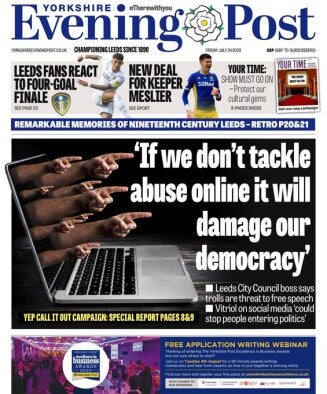
Guardian columnist Owen Jones has advised journalists targeted by online abuse to “take it seriously” after he saw for himself how it can trickle into real life – but urged colleagues to “never to let them win”.
The increasing “barrage” of online abuse was raised in the House of Commons last Wednesday soon after a survey of regional journalists found more than 80% feel the problem has got “significantly worse” since the start of their careers.
Jones (pictured) agreed, telling Press Gazette it has got “infinitely worse” in the past few years. He says death threats and abuse have become a “tedious” part of his life, with police often having to become involved.
He said: “The problem is it trickles into real life… from my own experience there was a sense of ‘well it’s only words on the internet’, but actually unfortunately a big part of my life now is the constant threat of far-right violence and I have to go to great lengths in quite a tedious fashion when doing my job, not just to protect myself but people around me”.
In December 2018 Jones was heckled and abused while taking part in an interview for Sky News on College Green in Westminster. The pro-Brexit protesters then chased after him, calling him a “traitor”.
In August 2019, Jones was attacked outside a London pub while celebrating his birthday. Jailing the ringleader for two years and eight months, the judge ruled the attack was “wholly unprovoked… by reason of [Jones’] widely published left-wing and LGBTQ beliefs by a man who has demonstrable right-wing sympathies”.
Jones said the link between the online domain and the real world was clear after he trawled through social media posts connected to his attacker: “One of his best friends had spoken about me to someone else: ‘If you see him make sure you knock him out’.”
‘The key thing is never to let them win’
Another man has just been jailed for three months in Northern Ireland for sending Jones a threatening message on Instagram.
It said: “As a supporter of the far right, I think I speak for a lot of people when I say I hope you get a bullet to the brain.
“…when we are in charge, all you liberals and traitors and fake news journalists and dead meat, along with your families. And you will be first up against the wall you just wait and see.”
Although he did not refer that instance to police himself – it was shared with the PSNI by his supporters after he posted a screenshot on Twitter – Jones repeatedly urged other journalists to report serious threats.
“It’s important to take it seriously because there is basically a very radicalised section of society which has become more extreme and radicalised over the last few years,” he said.
“If a journalist speaks uncomfortable truths and challenges a narrative that they are very attached to as part of their radicalisation then their view is that person should be intimidated and terrorised and that’s how they behave.”
But, he added: “The key thing is never to let them win, people that intimidate you online, because if you stop doing your job or saying things because you think I don’t want to incur the wrath of these people then you’re living in their world already.
“That’s one thing – I don’t stop speaking out against racism and Islamophobia and stuff because I’ve been targeted by Islamophobic, far-right extremists which is one of the main reasons they’ve latched onto me.”
Political polarisation
Jones said the worsening abuse was due to the “unprecedented political polarisation” that’s taken place in UK society starting with the Scottish independence referendum in 2014.
“Some media organisations have whipped up bile and hatred against minorities and against those deviating from the political consensus in a way that has clearly radicalised people,” he said.
But Jones does not support prison being used in these sorts of cases despite the two men who have been jailed for attacking and abusing him, favouring better investment in rehabilitation programmes instead.
He said: “If people are threatening regional and national journalists then they need to be deradicalised, they need to be rehabilitated, and you need to invest in programmes that do that, not arbitrarily throw some of them into prison and then they’re let out again without any change to their underlying attitudes.”
Jones also suggested there should be a helpline journalists could phone and get advice when they are being targeted online – not as a substitute for alerting the police, but for additional support. “I would have benefited from that probably,” he said.
‘Constant barrage’ for regional journalists
A recent survey by Newsquest Oxfordshire editor Samantha Harman, who asked regional journalists about their experiences with online abuse related to their work, found that 84% want more to be done to tackle the problem.
Many said they had experienced anxiety or depression as a result, with 89% getting abuse on Facebook, 80% on their own sites and 67% on Twitter.
Harman said: “Constructive criticism is welcomed by our profession — but that’s not what we’re talking about here.
“It’s a constant barrage of abuse, most notably on social media.
“We’ve seen a toxic rhetoric emerge over the last couple of years that all journalists are ‘scum’ and that it’s acceptable to hide behind the internet to say whatever you want to them.
“I can’t imagine anyone walking into a shop and telling the 22 year-old shop assistant she is scum, a disgusting idiot who should be shot or beheaded. But every day, this is reality for our young reporters. And there is no off switch.”

Labour MP Holly Lynch. Picture: UK Parliament
Labour MP Holly Lynch raised the issue in the House of Commons on Wednesday, noting the “impact of the barrage of online abuse” on journalists at the Yorkshire Evening Post in her constituency – and that female reporters were the most frequently targeted.
Lynch said: “Editor Laura Collins, who I commend for her leadership on this issue, told me this week that the sentiment of one comment on Facebook responding to an article about the local restrictions in Leeds was not uncommon: it said ‘Whoever is publishing these articles needs executing by firing squad’.
“The newspaper reported it to Facebook on 28 September and nine days later is yet to receive a response.”
 The YEP launched its “Call It Out” campaign hoping to make social media a better place, while Lynch described unregulated online abuse and hate as a “public health ticking time bomb” as she pushed the Government to do more with its online harms bill.
The YEP launched its “Call It Out” campaign hoping to make social media a better place, while Lynch described unregulated online abuse and hate as a “public health ticking time bomb” as she pushed the Government to do more with its online harms bill.
A webinar hosted by the International Press Institute on Tuesday heard some tips for newsrooms on dealing with the issue.
Staff need to feel they can come forward
Jason Reich, vice president for corporate security at the New York Times, rejected the “unhealthy” idea that receiving online abuse is part of the job that needs similar preparation to being a war reporter in the field.
“If you go and cover a war then danger is part of the job and that’s acceptable and understood,” he said.
“I reject the thought that if you’re going to write about a musician or anything else not relating to armed conflict that danger should be part of that job.”
Reich advocated peer support networks which he said had been successfully implemented at Reuters although not yet at the NYT, so journalists have a way to talk about their concerns with colleagues.
Viktorya Vilk, director of digital safety and free expression programs at PEN America, recommended that news organisations reiterate at every available opportunity that “you believe as an institution online harassment is a real problem that has serious consequences on people’s personal and professional lives” so staff do not feel they need to act as though they have a “thick skin”.
She also recommended organisations do an anonymous survey so they can get an idea of the scale of the problem internally, what people are facing and what they might need by way of support.
“And I would also say that creating policies, protocols and offering resources from leadership down is a very good signal that you take something seriously and that people can come forward,” she said.
“If there’s nothing in place, there’s a perception that nobody thinks it’s a serious problem and it doesn’t actually need to be addressed in any way.
“It has to be set up at the top and permeate through so people feel if they went to a senior leader in the newsroom they would not be dismissed, they would not be mocked and told to get over it but would be taken seriously and offered some kind of support.”
Picture: Reuters/Simon Dawson
Email pged@pressgazette.co.uk to point out mistakes, provide story tips or send in a letter for publication on our "Letters Page" blog
